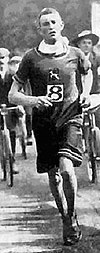Charles Hefferon
| athletics | ||
| silver | 1908 | marathon |
Charles Hefferon ( Charles Archer Hefferon ; born July 18, 1878 in Bishop's Green , Berkshire , England , † May 13, 1932 in Brampton , Ontario , Canada ) was a South African athlete and medalist at the Olympic Games .
Life
Hefferon left his small birthplace near Newbury at a young age and emigrated to Canada, where he first settled in Brandon ( Manitoba ). He joined the Canadian Armed Forces early on, with whom he was called to South Africa in 1901 to fight in the Second Boer War. After the end of the war in 1902 he stayed in South Africa, where he married in Bloemfontein .
Hefferon undoubtedly had an exceptional running ability which earned him the one-mile and four-mile South African championship without a break between 1904 and 1909 . In 1909 he also won the ten mile title.
Hefferon reached his sporting climax in 1908 at the Olympic Games in London , where he competed for South Africa, the country in which he has now lived for seven years.
On July 15, Hefferon started in the first of six heats over five miles. The six preliminary winners and the four fastest runners-up qualified for the finals. Hefferon finished second behind John Svanberg , who was considered one of the world's best long-distance runners at the time , but achieved the best time of all second-placed runners and was therefore eligible for the final. On July 18, at the final run, Hefferon had to be content with fourth place among ten participants and thus narrowly missed the honor of being the first medalist for South Africa to go down in history at the Olympic Games.
On July 24th, two days after his compatriot Reggie Walker became Olympic champion in the 100-meter run, Hefferon started the marathon . From the start of the race, Hefferon was always in the leading group and let himself be carried away by the extremely high speed. After 23 km he even took the lead and after 32 km he had a lead of 3:52 minutes over the following runner Dorando Pietri . After that, however, Hefferon had to pay tribute to his pace, his kilometer average increased to 5:15 minutes, and yet after 38 km he had a lead of almost two minutes. Eventually Hefferon had to reduce his running pace and went into a high walking pace, which meant that Pietri was able to overtake him after 40 km, and John Hayes also passed Hefferon shortly before he entered the stadium. As third he was just entering the stadium when a drama about the first runner Pietri unfolded on the finish line. Due to the later disqualification of Pietri because of outside help, Hefferon finally achieved second place. Some officials of the South African team even saw Hefferon as the winner, because they were of the opinion that Hayes had also used outside help on the route. It was Hefferon who pushed for the protest to be withdrawn.
Placements at the Olympic Games:
- IV. 1908 Summer Olympics, London
- Marathon - silver with 2: 56: 06.0 h (gold to John Hayes from the USA with 2: 55: 18.4 h; bronze to Joseph Forshaw from the USA with 2: 57: 10.4 h)
- 5 miles - fourth with 25: 44.0 min (gold to Emil Voigt from the United Kingdom with 25: 11.2 min.)
Hefferon stayed in England for a while, took part in a few runs, but then returned to South Africa, where he lived until 1911. After that, however, he moved back to Canada. He returned to Europe as a soldier in World War I and stayed there until the end of the war. When he returned to Canada, he looked for a new job and found it in the police force . He went through several departments until he started as a motorcycle patrol with the Highway Patrol in 1930 .
On May 12, 1932, Hefferon had an accident with his motorcycle in a collision with a car, the driver of which overlooked him when he turned off a side road onto the highway while on duty. A day later, Hefferon died in hospital from his injuries.
The date of death of Hefferon has been confirmed thanks to a police report, but his date of birth is not clearly established. In various literature on the Olympic Games, January 25 is often mentioned as the day. The year, however, is almost the same in all publications.
| personal data | |
|---|---|
| SURNAME | Hefferon, Charles |
| ALTERNATIVE NAMES | Hefferon, Charles Archer (full name) |
| BRIEF DESCRIPTION | South African long distance runner and Olympic medalist |
| DATE OF BIRTH | July 18, 1878 |
| PLACE OF BIRTH | Bishop's Green , Berkshire , England |
| DATE OF DEATH | May 13, 1932 |
| Place of death | Brampton , Ontario , Canada |
